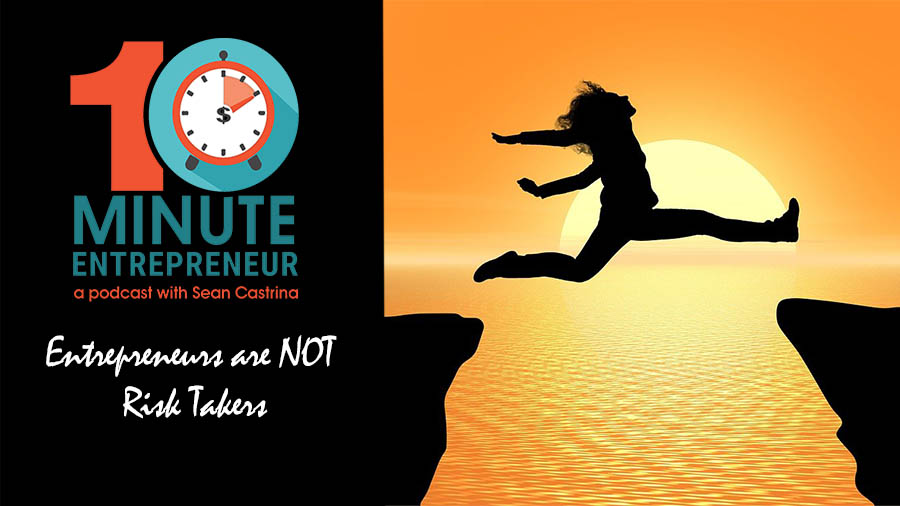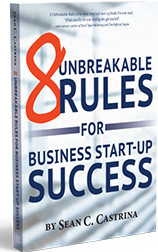Everyone always say’s “Entrepreneurs are risk takers!” – well is that true? Find out in today’s episode!
Entrepreneurs are not risk-takers.
Let me say that loudly. Entrepreneurs are not risk-takers.
It drives me crazy. I looked up risk-taking in the dictionary, and Merriam-Webster had the very definition of risk-taking as an entrepreneur.
Not really. This is what it said, it said, “Starting a business is always involves some risk-taking”.
Okay, so we have to find out what risk is because I don’t like this entire theory. See, risk is the act of doing something that involves danger…but that’s kind of rhetorical because they’re defining risk as involving danger in order to achieve a goal. Let’s talk about this for a second. What am I really risking if a business fails? Money and/or time.
So Let’s keep things in perspective for a second. This is not someone going off to war…That my friend, that’s a risk. Losing money in time, in the scale of life, that’s not a risk. It’s just not a risk. So let’s keep it in life. There’s a risk when I write a four-wheeler on vacation because I want a little bit of an adrenaline rush.
There are risks everywhere, so keep the risk in perspective. Analyze what are you putting at stake. In business, you’re putting money in time.
What I would tell you, Successful entrepreneurs are calculated risk-takers.
Defining it as anything with a little bit of danger in it as a risk taker, I’ll accept that idea a little bit. Yeah, I could lose money, I could lose time. I could also control how much time I’m willing to put in it, and I actually can control how much money I’m willing to put into it. What successful entrepreneurs are calculated risk-takers.
Example: Going to work. There’s no guarantee you’re going to have a job at the end of the day. Get pissed off and curse out your boss and tell me if you have a job at the end of the day. Take a nap around 1 o’clock right in the middle of the office and tell me if you still have a job at the end of the day. My point is, is that you could be let go today for reasons that you have control over or reasons you may not. For all you know the last month, people above you have been strategizing how to eliminate your position. That’s a part of the big strategy, you just not privilege that information.
What if they’ve been interviewing people half your age to replace you at a fraction of your salary? I can give you all the reasons that they do. It sounds good, but it’s you not having a job at the end of the day.
When we look at risk and we really analyze that, we’re putting money and time at stake. We understand that, and we understand that we’re going to re-define risk as is where the outcome is not guaranteed. The outcome that we’d like to happen is not guaranteed.
I’m making the foundational statement that great entrepreneurs are not risk-takers in that we are looking for danger like we are playing roulette. We know we are calculated risk-takers and that yeah, we get involved in things and the outcome is not guaranteed, but we put so many things in our favor that we believe the outcome is going to be going our way and if by chance it doesn’t, our losses are a fraction of what we were going to make. So let me take you through the seven things.
The Payoff is Greater than the Risk
The potential pay-off, is 10 times greater than the money at risk. I don’t take risks on a one-to-one ratio. I’m going to put this $10 up, and if I get lucky, I might make my money back and get to keep it.
No, you put $10 up against $100. So entrepreneurs are looking for a pay-off that is just so great that what we put up in time and/or money doesn’t seem like a risk.
We look at it this way: If this one fails and I start another one, and that one fails and the third one succeeds, I’m going to get all my money back in the lesson that I learned. That’s why the second startup is statistically the one that succeeds.
That’s why I don’t feel like it’s just a blind risk, it’s a calculated risk.
We Beta-test Our Ideas
You can put up a simple landing page to test products and consumer response. You can offer something that you don’t even have physically in your possession right now, and if you get a great response, you’ll sell it. We beta-test things to make sure that we have a wanting audience. We do things that we micro-test it, we do a small sample, we don’t go We don’t assume, Oh, this is going to work perfectly. No, we’re going to test a few things, test the messaging, ttest whether there’s traction with the product and there’s a want.
We Mitigate Our Exposure to Risk
When I create a start-up and write my business plan, I put in a time period that if we don’t reach these measurables by this time, I’m out. And it removes emotion. If I don’t reach break-even at this point, I’m out. It removes emotion. I’m willing to lose this much money and I’m out So when I go into the plan, I already have an exit strategy. I don’t sign long-term leases.
Our Business Plan Accounts for Risk
I put together a strategy in my business plan where all the risk I can see is accounted for. Obviously, there are things that I can’t account for, but I assume there’s going to be some risk. I have competition here. Maybe it starts slow, whatever, but I put together a strategy so that I have some assumptions that may happen.
The great theologian Mike Tyson said, “Everybody has a plan until they get hit in the mouth”. You’re going to get hit, but you can plan for as many things as you can.
We Stay in Our Lane of Experience
I do things that are in my lane of experience. In my case is not necessarily the industry, but my lane is service companies.
That’s my common denominator of businesses I like.
So typically, smart entrepreneurs stay in an area that they have a level of comfort. The person who created Massage Envy ended up using the same type of business model with chiropractic medicine. It’s the same basic model. One is getting a massage and one’s getting their back adjusted.
If you look at the Yum! brands, it’s like Pizza Hut, Taco Bell, and KFC. There’s a lane there. You see a common denominator there, they didn’t start a car dealership.
Partnering to Share the Risk
The strategy I use is to partner to share the risk. Sometimes you do that to share the finances of it. I partner with it to get expertise so that I have a better understanding of all the obstacles we may hit. You can partner to understand what things may look like a potential risk down the road.
We Never Go All In
You never go all-in unless you’re 25 years old or less and you live with your parents or you’re living in your buddy’s apartment on the floor because you have nothing to lose.
You’re putting up time when your young and money that you can make it back.
we’re putting up time and money.
So what we did is we look at risk through a better paradigm today. I gave you a different view of how I view risk, and that’s why I don’t think entrepreneurs are risk-takers. Not at all.


